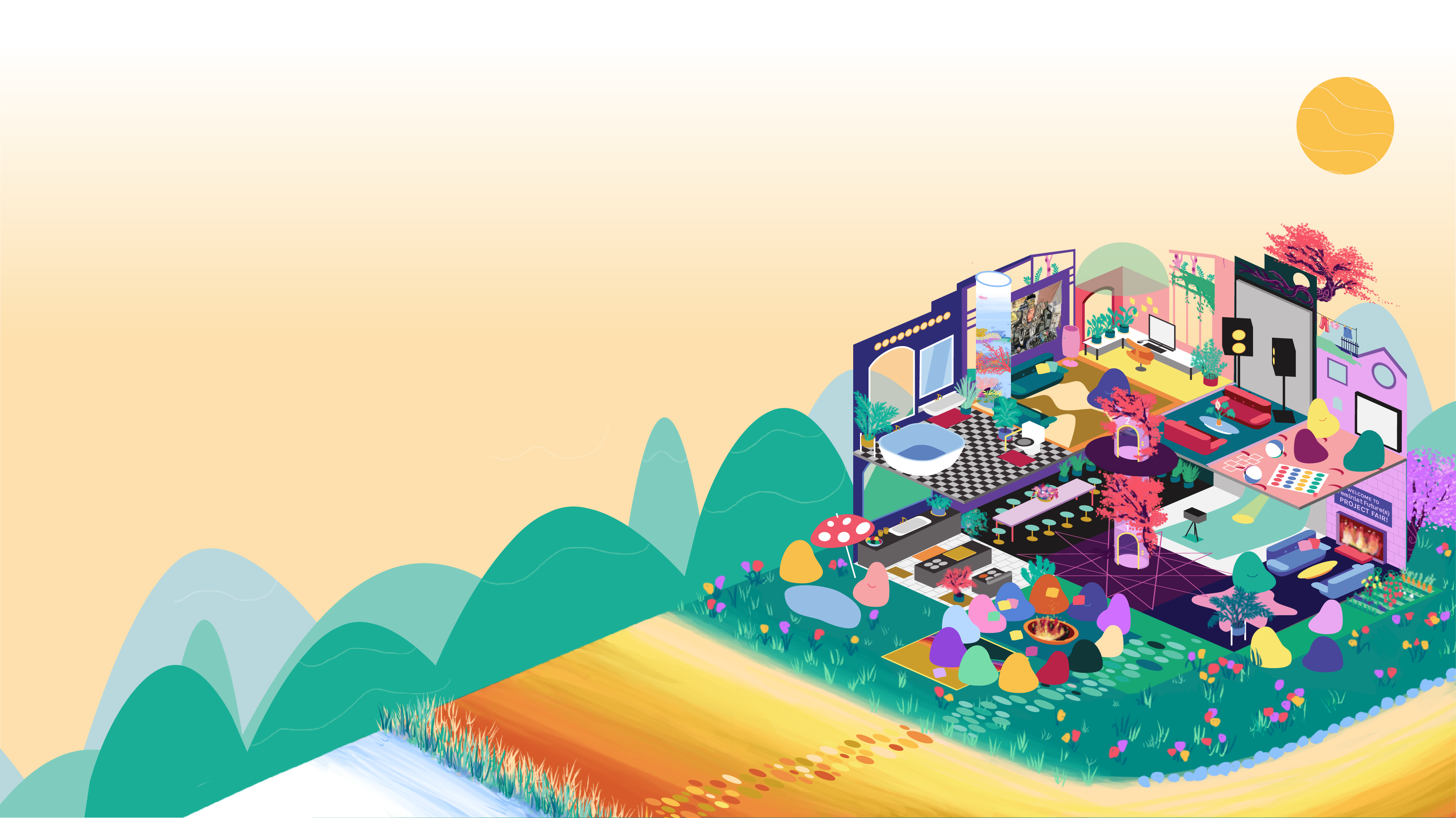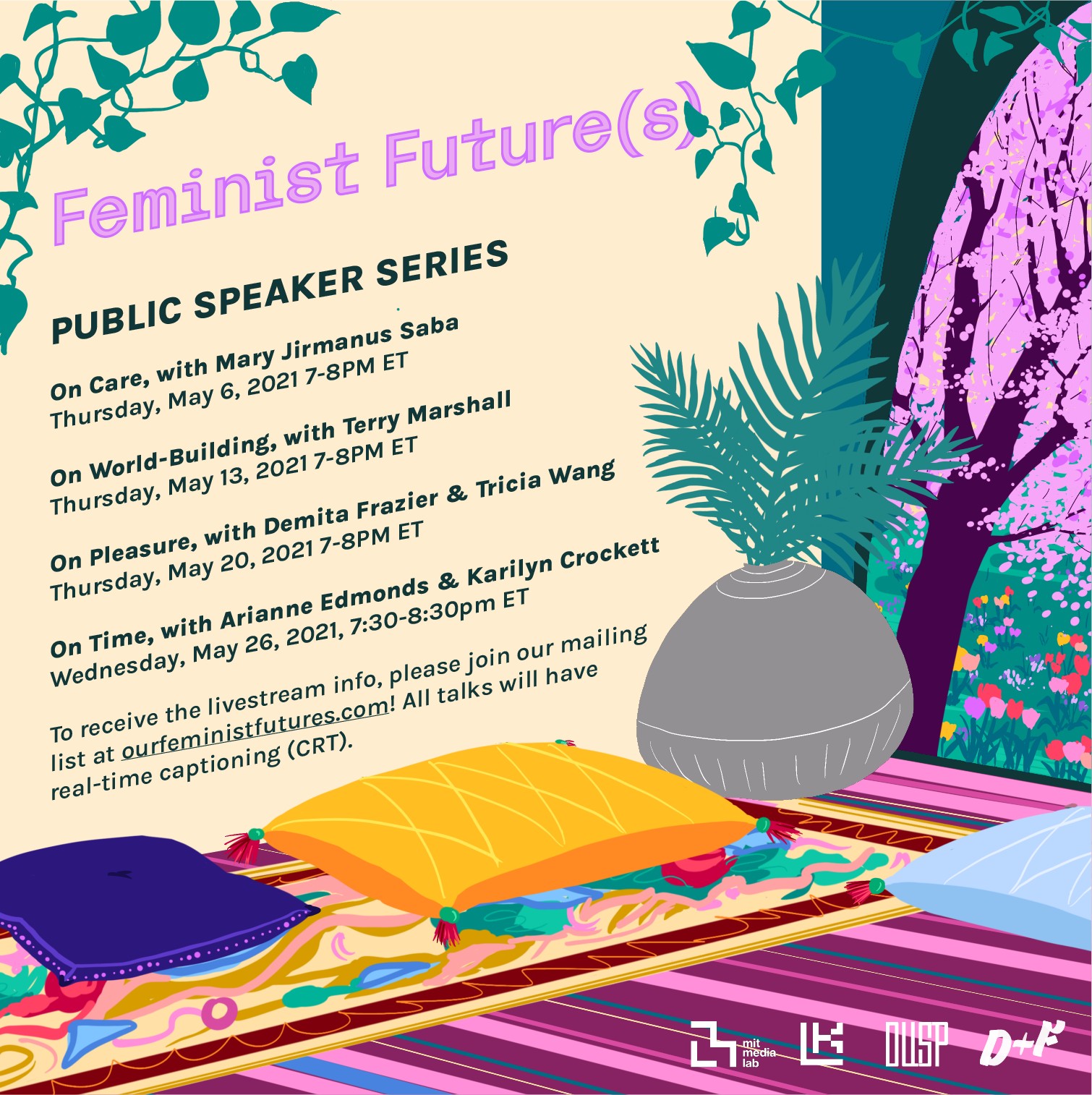2020 — 21
Feminist Future(s) Hackathon
Co-organized with
Alexis Hope, Catherine D’Ignazio, Josephine Hoy, Jenn Roberts, Laura Zittrain
Organization Partners
The Renée,
Period Equity,
Pueblo Action Alliance,
National Domestic Workers Alliance (NDWA),
Sisters Unchained

A month-long Hackathon hosted between a website, Discord server, Zoom events, mailed gifts
From May 3-30, 2021, our team hosted a virtual hackathon, public speaker series, and virtual art exhibition around feminist innovation and values. In response to the unequal isolation and crises experienced during the global COVID-19 lockdowns, we conceptualized the virtual hackathon as taking space in a shared fantastical and living house. At every turn, we wanted to center joy and care.
The house became an archive of memories — it grew new objects and spaces alongside the planned and spontaneous experiences and needs felt by hackathon community members. This included growing a “backyard” art exhibition space, multiple “living room” spaces, and a “firepit” for gatherings.

Feminist Future(s) website homepage after the event on May 30, 2021

Alexis introducing our first virtual gathering at an evening firepit on May 3, 2021
 Illustration for the final Project Fair to conclude the month-long hackathon on May 27, 2021, showing the new “interior” and “exterior” spaces of the house
Illustration for the final Project Fair to conclude the month-long hackathon on May 27, 2021, showing the new “interior” and “exterior” spaces of the houseOf 500+ applicants, we selected 50 hackathon participants from around the U.S. Participants formed 12 teams across four tracks. Each track was mentored by incredible organization members:

The SisterSong Women of Color collective defines Reproductive Justice as the human right to maintain personal bodily autonomy, have children, not have children, and parent the children we have in safe and sustainable communities.
This track was mentored by two organizations — The Renée and Period Equity.

Environmental justice promotes healing the land and waters, restoring and protecting Indigenous land rights, and advocating for sustainable ways of living. Environmental justice centers the people most impacted by environmental and climate catastrophes.
This track was mentored by Pueblo Action Alliance.

Care workers include home care workers, nannies and house cleaners, and this work happens in formal and informal sectors, in private households with individual employers. In a feminist care economy that centers race and gender equity, care work is valued and generously compensated, care workers are treated with the dignity they deserve, and we would cease exploitation of the underpaid and unpaid labor of women. All care workers — especially domestic workers — work in safe conditions, fair and consensual labor relationships, and are protected by labor laws and benefit from all social welfare systems.
This track was mentored by the National Domestic Workers Alliance Labs (NDWA Labs).

Prison abolition demands a world without carceral or punitive systems, which inflict violence on individuals, families, and communities. These carceral systems result in the social construction of “crime” and do not address the root causes of harm or violence in a community.
This track was mentored by Sisters Unchained.
To inspire and gather teams beyond work, we hosted one public speaker and one workshop facilitator each week to explore the week’s theme. Public speaker recordings can be found here.
Week 1 - Care
Workshop on equity and design with Jenn Roberts
“Reframing for Radical Care” with Mary Jirmanus Saba
Thursday, May 6, 2021 7-8PM ET
Week 2 - World-Building
Workshop with the Oracle for Transfeminist Futures
“World-Building and the Black Imagination” with Terry Marshall
Thursday, May 13, 2021 7-8PM ET
Week 3 - Pleasure
Workshop on Sexual Healing / Designing for Pleasure & Trauma by Nienke Helder
“Growing Communities of Care” with Demita Frazier, J.D. and Tricia Wang
Thursday, May 20, 2021 7-8PM ET
Week 4 - Time
“Re-making the Past to Re-make the Future” with Arianne Edmonds and Karilyn Crockett
Wednesday, May 26, 2021, 7:30-8:30pm ET

Graphic for public speaker series, set in a “living room.”
Our teammate Laura Zittrain also organized a virtual art exhibition title “Between the Future and Familiar” in the ‘backyard,’ exhibiting work by musician Maryam Qudus, poet Wairimu (Grace) Mugo, and textile and collage artist Krystle Lemonias. We created a custom webpage to host their artwork, as well as an opening night event on May 18, 2021.
After the month, almost all teams continued to meet about their projects and new collaborations beyond the hackathon timeframe. Interventions included
- several interactive resource maps for Black, Brown, and Indigenous communities;
- dinner conversation cards to counter stigmas around reproductive health; and
- a dictionary to begin building shared vocabulary around care.
Our hackathon inspired two other independently organized “Feminist Futures” hackathons in London and Helsinki.
Most importantly, it became a personal and political space where people who wanted to sit with and prototype more feminist futures could gather together during the COVID-19 social quarantine. One participant shared with us:
By the time I joined FF, I was depleted. But our cohort generated so much good feminist/womanist energy — rejuvenating! Thanks to each of you for that and the resources shared. ... This Hackathon is the most refreshing experience I’ve had in a long time.
Resources
︎ Feminist Future(s) Hackathon website
︎ Work by teammates to re-contextualize hackathons: ‘The Personal is Political’: Hackathons as Feminist Consciousness Raising